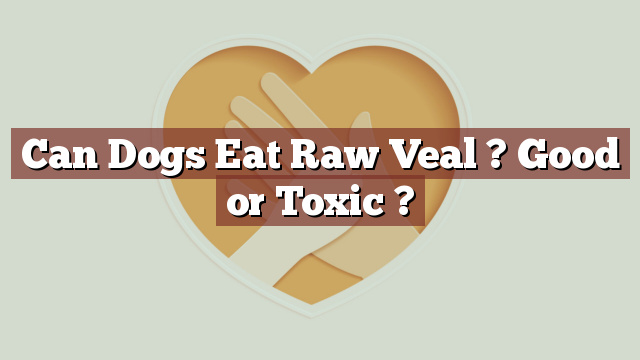Can Dogs Eat Raw Veal? Good or Toxic?
Knowing what foods are safe for our dogs is essential for their overall health and well-being. One such food that dog owners may consider feeding their pets is raw veal. But is raw veal safe for dogs to eat? In this article, we will explore the nutritional value of raw veal, its potential risks and benefits, and what steps to take if your dog accidentally consumes raw veal.
Nutritional Value: What does raw veal offer to dogs?
Raw veal is a source of essential nutrients for dogs. It contains high-quality protein, which is vital for muscle development and repair. Additionally, raw veal is rich in vitamins and minerals such as iron, zinc, and B vitamins. These nutrients play a crucial role in maintaining a dog’s overall health and supporting their immune system.
Is Raw Veal Safe or Toxic for Dogs? Let’s find out!
Raw veal can be potentially harmful to dogs and should be approached with caution. There is a risk of bacterial contamination, including the presence of harmful bacteria like Salmonella or E. coli, which can cause serious health issues in dogs. Furthermore, feeding raw meat can increase the chances of foodborne illnesses in both dogs and their human companions.
According to the American Veterinary Medical Association (AVMA), raw meat diets, including raw veal, can pose health risks to both pets and humans because of potential bacterial contamination. It is important to note that cooking meat to an appropriate temperature can eliminate these risks.
Potential Risks or Benefits of Feeding Dogs Raw Veal
Feeding raw veal to dogs carries certain risks that need to be considered. Apart from the potential bacterial contamination, a raw veal diet may not provide a balanced and complete nutritional profile for dogs. Commercial dog food is formulated to provide the optimal balance of nutrients for a dog’s specific dietary needs, whereas raw veal alone may lack certain essential nutrients.
On the other hand, proponents of raw feeding argue that it can promote healthy skin and coat, improve digestion, and enhance overall energy levels in dogs. However, it is important to consult with a veterinarian or a veterinary nutritionist to ensure that a dog’s diet meets all their nutritional requirements.
Dog Ate Raw Veal: Steps to Take if it Happens
If your dog accidentally consumes raw veal, it is essential to take immediate action. First, check for any signs of illness such as vomiting, diarrhea, abdominal pain, or lethargy. If any of these symptoms occur, it is crucial to seek veterinary care as soon as possible.
Furthermore, do not induce vomiting without consulting a veterinarian, as certain foods or substances may cause more harm if vomited back up. Be prepared to provide your veterinarian with accurate information about the amount and type of raw veal consumed, as well as your dog’s current health status.
Conclusion: Raw Veal – Proceed with Caution for Canines
In conclusion, raw veal should be approached with caution when considering it as part of a dog’s diet. While it does offer nutritional benefits, such as high-quality protein and essential vitamins and minerals, the potential risks of bacterial contamination and an imbalanced diet should not be ignored. It is always advisable to consult with a veterinarian or a veterinary nutritionist to determine the best diet for your dog’s specific needs and to ensure their overall health and well-being. Remember, the safety and health of our beloved pets should always be our top priority.
Thank you for investing your time in exploring [page_title] on Can-Eat.org. Our goal is to provide readers like you with thorough and reliable information about various dietary topics. Each article, including [page_title], stems from diligent research and a passion for understanding the nuances of our food choices. We believe that knowledge is a vital step towards making informed and healthy decisions. However, while "[page_title]" sheds light on its specific topic, it's crucial to remember that everyone's body reacts differently to foods and dietary changes. What might be beneficial for one person could have different effects on another. Before you consider integrating suggestions or insights from "[page_title]" into your diet, it's always wise to consult with a nutritionist or healthcare professional. Their specialized knowledge ensures that you're making choices best suited to your individual health needs. As you navigate [page_title], be mindful of potential allergies, intolerances, or unique dietary requirements you may have. No singular article can capture the vast diversity of human health, and individualized guidance is invaluable. The content provided in [page_title] serves as a general guide. It is not, by any means, a substitute for personalized medical or nutritional advice. Your health should always be the top priority, and professional guidance is the best path forward. In your journey towards a balanced and nutritious lifestyle, we hope that [page_title] serves as a helpful stepping stone. Remember, informed decisions lead to healthier outcomes. Thank you for trusting Can-Eat.org. Continue exploring, learning, and prioritizing your health. Cheers to a well-informed and healthier future!

